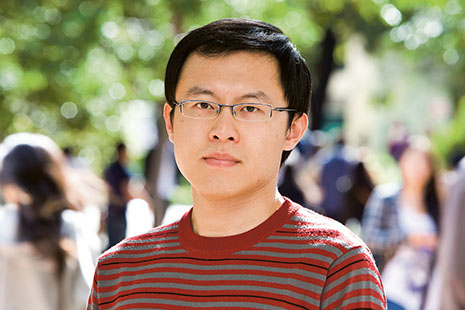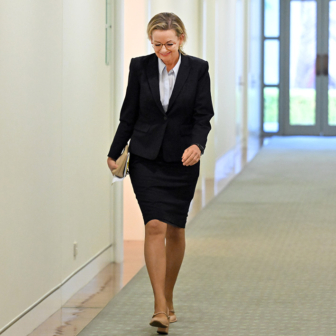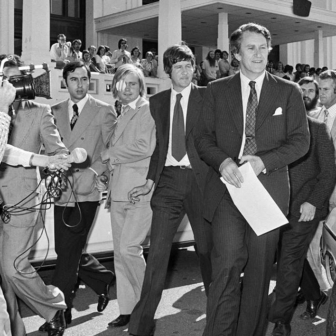ZHANG JIN came to Australia from China’s Guangdong province in 2008 to study translating and interpreting. Already fluent in English, his skills were listed as “in demand” by the federal government and he anticipated that once he had completed his master’s degree at RMIT University he would easily qualify for permanent residence in Australia. But after studying hard for two years – and paying $42,000 in tuition fees – he emerged from his course to find that the rules had changed.
It is not that Australia has rejected Zhang. His migration application remains valid, but – like tens of thousands of others – it is stuck in the system. So far he has waited sixteen months for his application to be processed. Others in his situation have waited more than two years and there is no end in sight.
“We deserve an answer,” says Zhang, “no matter whether that answer is yes or no.” The twenty-five-year-old is one of almost 40,000 international student graduates whose lives have been put on hold since the Department of Immigration and Citizenship, or DIAC, classified their visa applications as lowest priority.
We’re sitting drinking green tea in the house Zhang shares with a compatriot in the Melbourne suburb of Murrumbeena. On the coffee table is a selection of documents he has assembled for me, including DIAC’s proforma responses to his requests for more information about the progress of his case. The essential message from DIAC? There is “no set time limit for the processing of applications for skilled migration.”
Despite his full-time job as a research fellow at La Trobe University, Gerhard Hoffstaedter is also in limbo. The thirty-two-year-old German-born anthropologist is fluent in English, German and Bahasa Malaysia and completed a PhD at La Trobe in 2008 on a postgraduate scholarship funded by the university. Yet his application for permanent residency has been stuck in the visa processing queue for almost two years. “I like Australia and I want to make a contribution here,” he told me, “but it’s hard if there is no reciprocity.”
Zhang and Hoffstaedter are suffering the effects of federal Labor’s efforts to rein in the skilled migration program. The Howard government made it relatively easy for international students to gain permanent residency, and the result was a blow-out in migration applications. Labor’s immigration minister, Chris Bowen, says he is trying to re-focus the program so that it is “driven by the needs of the economy” rather than “by the desires of people who want to come here as skilled migrants.”
But the issue might yet rebound on Labor. Briefing papers obtained under freedom of information legislation reveal concern within the government that it is vulnerable to legal challenge for indefinitely stalling visa applications from people like Zhang Jin and Gerhard Hoffstaedter.
We think of skilled migration as an orderly process, like waiting at a supermarket deli counter. You take your ticket and expect to be served in turn when your number comes up. This is the “queue” that asylum seekers arriving by boat are supposedly trying to jump – the orderly line waiting to enter Australia.
But Australia’s migration processing system no longer works like that. Since the beginning of 2009, the federal government has run a system of “priority processing.” Instead of processing applications for permanent residency in the order they were lodged, DIAC now sorts them into four categories, and processes them in order according to the category number assigned. Category 1 visa applicants – the first to be processed – are sponsored by an employer; category 2 applicants are sponsored by a state or territory government; category 3 applicants are those who have nominated an occupation on the new Skilled Occupation List introduced in July last year; and category 4 covers the remaining applicants.
The categories are set in line with Australia’s perceived demand for different skills and qualifications. So, for example, a brain surgeon will be granted a visa before a translator or an anthropologist, and a migrant who is sponsored by an employer will be processed ahead of someone who applies independently. In other words, visa processing is no longer a matter of “first in, best dressed,” but is the reverse, “best dressed, first in.” The result is that category 4 visa applications – including those of Zhang and Hoffstaedter – languish untouched.
AFTER the introduction of priority processing in 2009, the official advice on the DIAC website was that category 4 applications were “unlikely” to be finalised “before the end of 2011.” As that date draws closer, the department appears to be backing away from even such a vague indication. Its website currently offers no prospective timeline whatsoever, and blandly tells applicants in category 4 that they “will have a long wait for visa processing.”
DIAC’s “client service charter” helpfully states that category 4 applicants will not be processed until “all cases in priority groups 1–3 are finalised.” But since new higher-priority applications are entering the system all the time, it’s hard to see the day ever dawning when bureaucrats will finally turn their attention to those in category 4. In effect, they are on permanent hold.
“It doesn’t seem like fair dealing,” says Zhang as we leaf through his documents. “They need to set a time frame for us. If they don’t process us, then we can’t move forward with our lives.” Like other applicants in category 4, he remains in Australia on a bridging visa, which allows him to work or to study, but which makes it extremely difficult to plan for the future. It is an uncertain existence that inhibits major life decisions like buying a house. Hoffstaedter says the restrictions of a bridging visa prevent him from becoming a full member of Australian society: “I would like to become a citizen and play a more active part in political life here, but for now I can only comment as an outsider.”
Even international travel is difficult. Bridging visa holders must get permission to leave Australia or else they will not be able to return and their applications for permanent residency will be cancelled. DIAC will only grant travel approval if an applicant demonstrates one of two “substantial reasons” for needing to leave Australia: the serious illness or recent death of a close relative overseas, or the work requirements of an Australian employer. For Hoffstaedter, who travels regularly in Southeast Asia for his research, this has meant Kafkaesque battles with the bureaucracy to enable him to do his job.
Priority processing is part of a suite of measures introduced by the Labor government to clean up problems in international education (shonky private colleges being the prime example) and deal with a blow-out in the skilled migration program. By dangling the carrot of permanent residency as an incentive to study in Australia, the Coalition government under John Howard effectively funnelled large numbers of international students into low-quality vocational courses offering a quick and apparently guaranteed route to permanent migration.
To address the problem, Labor has gradually recast the system. It requires international students to provide evidence of a much higher level of savings before they are granted a visa to study in Australia; it has introduced tighter integrity checks to prevent document fraud; it has narrowed the list of skilled occupations that are eligible for independent skilled migration; it has lifted the required degree of English language proficiency; and it has redesigned the migration points test to put less weight on study in Australia and more emphasis on the level of qualification, professional experience and language skills. (The new points test is set to operate from 1 July this year, assuming parliamentary approval.)
Change was obviously needed. Under the old system Australia was attracting far more valid applications for skilled migration than there were places on offer. Last year the processing backlog blew out to more than 150,000 applications, equivalent to almost two and a half times Australia’s entire annual skilled migration intake at projected levels.
The changes to skilled migration were justified on the grounds that Australia has the right to determine which professionals are most urgently needed in this country and the order in which they come. If the system is explained in advance then potential migrants know in advance which category they fall into and can calculate whether or not it is worth applying and how long they might have to wait. The problem is that priority processing was introduced retrospectively, leaving the tens of thousands of international students already living in Australia caught between the old system and the new.
Hoffstaedter says it is “absolutely the government’s prerogative” to reform the skilled migration program in line with the nation’s economic needs, but he says the government should “let applicants know what to expect” and not keep changing the rules after an application has already been lodged.
According to DIAC statistics there were 38,800 category 4 visa applicants living in Australia as of 31 October 2010. At that stage almost 5000 visa applicants had already been waiting for more than two years for a decision on their cases, while another 19,000 applicants had been waiting for more than twelve months. (In addition to this “onshore” case load there are another 60,000 “offshore” applications lodged overseas that have been with the department for more than a year.)
In an interview on ABC Radio National’s The National Interest in late February, Minister Bowen said he understands that people stuck in the migration processing queue “are frustrated.” But he said that “the skilled migration program is there to bolster the economy” and to be “responsive and flexible” to the needs of Australian businesses. Priority processing is the best way to achieve this goal, in his view, and any other course of action would be “irresponsible.”
During the interview the minister characterised category 4 as “a group of people who came to Australia with a view to permanent migration and… to study, frankly, courses which were designed to maximise their chance of permanent residency, courses such as hairdressing and cookery and others.” Such words make Zhang bristle. “My English is good and I have particular skills,” he says. “I have substantial English teaching experience in lecturing and tutoring non-English speakers. I have facilitated a great deal of business conferences and governmental exchanges between China and Australia when I served as an interpreter.”
It annoys Zhang to hear himself and others in category 4 constantly dismissed as “cooks and hairdressers,” only interested in permanent residency and with little to offer Australian society. “I have several [category 4] friends working as professionals in education institutes and private companies in Australia,” he says. “They hold various kinds of higher degrees – master’s degrees and PhDs – in fields like chemistry, IT and biotechnology.”
He points out that he and his friends all work and pay taxes but remain ineligible for most government benefits and services. “We have been living in this country for a long time, at least four years on average. And we are contributing to this society with our skills. We are not useless people as the minister suggests. We are functional and integral parts of this society.”
Since I began reporting on this issue almost two years ago, I have been in touch with scores of category 4 applicants from a broad range of backgrounds, including a Brazilian expert in international trade negotiations who speaks four languages fluently, a medical scientist from France engaged in cancer research, an aspiring Chinese entrepreneur with a master’s degree in business law, a Sri Lankan IT graduate working in the health industry, and a US Marine Corps veteran who has an honours degree in digital media. I have also come across cooks and hairdressers – all of them employed and some hoping to establish their own businesses in Australia, if their visa uncertainty is ever resolved.
The minister says that progress is being made in reducing the skilled migration queue, pointing out that the backlog has come down from a peak of 150,000 in 2010 to about 130,000 today. But this was achieved largely through a controversial decision by the previous minister, Chris Evans, who used his power to “cap and cease” certain classes of visa applications. With a stroke of the minister’s pen, about 20,000 applications were culled from the backlog. The action only applied to applications lodged before 1 September 2007 and to certain narrow sub-classes of visas that have since been superseded. Without new legislation to grant him extra powers, the current minister cannot employ the same trick again.
At a briefing for the Migration Institute of Australia in Canberra on 10 March, senior DIAC officers said they anticipated that processing of category 4 applicants would commence “in the coming year.” Even if this does happen, the speed with which they are processed will inevitably depend on the size of the skilled migration intake set by the federal government in the May budget and on the number of new applicants entering the system in categories 1, 2 and 3, which will always take priority over category 4. Even if the department were able to cut the number of pending cases on its books by 20,000 a year, it would take at least six more years to clear the backlog and category 4 applications would be the last processed.
AT SOME point during that period the legal issues raised by the delays – in terms of Australia’s international obligations and domestic law – could come to a head. Among the applicants stuck in the queue are people who are separated from their wives, husbands or children. Migration lawyer David Bitel says he comes across distressed graduates who are languishing in category 4 on “a daily basis.” He cites the example of a Nepalese woman – we’ll call her Anuja – who sent her infant son back to Nepal to be cared for by his grandparents while she studied and worked in Australia. As a result, Anuja’s son was not with her when she applied for permanent residency and was not included on her bridging visa.
Anuja can’t be reunited with her son in Australia until a decision is made on her application for permanent residency. As a graduate in commercial cookery, Anuja is in category 4. She has already been separated from her son for more than a year and, as things stand, their separation is likely to stretch well into the future.
David Bitel says he wrote to the minister about Anuja’s situation and received the response that nothing could be done. “Ultimately, she’ll get her residency and ultimately she’ll bring the child out to Australia,” he says. “But one wonders about the effects on that poor kid, being separated from his mother for so long.” As a lawyer aware of Australia’s international responsibilities as a signatory to the Convention on the Rights of the Child, Bitel also wonders whether Australia “is in breach of its obligations in this particular scenario.”
Breaches of international human rights instruments are not the only legal issue at stake here. The DIAC “red book” – the policy briefing handed to an incoming minister by his or her department after a federal election – warns Chris Bowen that there are “around 106,000 former students on temporary or bridging visas awaiting resolution of their permanent residence status.”
Released under freedom of information laws, the red book says that all of the 106,000 graduates awaiting processing by DIAC are “fully grandfathered” against recent changes to the skilled migration program, but that “many are likely to be in limbo for some time, as under current priority processing directions they are last in the queue.” It warns the minister that these students could launch legal action against the Commonwealth, since under the Migration Act “a person who lodges a valid application is entitled to a decision.” As the red book states plainly, no decisions are currently being made in category 4 cases: “The use of priority processing directions in recent years… in combination with high applicant numbers, has meant that some people are persistently at the bottom of the queue with their application unprocessed.”
Already category 4 applicants are organising online under the banner, “Let us be united and fight for ourselves!” Some frustrated applicants have also lodged complaints about their treatment with the Commonwealth ombudsman. It may only be a matter of time before they mobilise themselves sufficiently to initiate legal action against the Commonwealth. The argument would be that the indefinite suspension of their visa applications essentially amounts to a failure to make a decision under the Migration Act. The wording of the red book’s warning suggests the students could have a compelling legal case. It also warns that many current students at Australian universities and colleges may also have expectations of permanent residency in Australia and will lodge migration applications after graduation, which could have far-reaching implications (see box below).
IN THE meantime, people stuck in category 4 get on with their lives as best they can. Gerhard Hoffstaedter finds his tenuous situation somewhat ironic because his research at La Trobe’s Institute for Human Security involves working with displaced people and refugees in Southeast Asia. This makes him aware that he is relatively well-off in comparison to many people around the world whose lives are in limbo. But the delays in processing his visa application are nevertheless unsettling and frustrating.
Hoffstaedter is in a long-term relationship with an Australian citizen and could speed up the process of getting permanent residency by applying for a spousal visa. It’s an option he is reluctant to take. For a start it would mean paying a new visa application fee to DIAC ($1735 for a partner visa) and forfeiting the thousands of dollars he’s already spent applying as a skilled migrant, including the non-refundable processing charge ($2575) and the associated costs of migration advice, skills recognition, language testing, health checks and police clearances.
But money is not the real issue – for Hoffstaedter it’s more a matter of principle. “I think I have good skills and I have a full-time job and that tells me my skills are needed in Australia,” he says. “I have paid all the fees and done all the tests. I have kept up my end of the bargain so I don’t see why I should change my application. I’m staying in the boat I’m in right now.” In his spare time, he helped set up the Free University in Melbourne’s inner northern suburbs.
With a law degree from a Chinese university, Zhang Jin’s long-term aim is to build a career in business. A qualification in translating and interpreting was one important step down that path and Zhang had always planned to continue his education with a degree in engineering and experience in the resources industry. “I planned to work in Australia for several years and then go home and set up a business in China,” he says. “There are lots of economic links between China and Australia and I thought I could be a bridge connecting the two countries.”
Before leaving China, Zhang carefully compared study in Australia to study in other English-speaking countries including Britain, the United States and Canada. He did his own research and was not lured by the false promises of recruiters, who “often tell lies,” he says. Australia’s relative proximity to China, its large Chinese community and the low dollar (at the time) all weighed in Australia’s favour. The potential pathway to permanent residency was also a significant consideration. Zhang hoped that after getting his master’s degree he would qualify for permanent residency and gain a Commonwealth-funded place to study engineering. He has decided to embark on the degree anyway, paying full fees as an international student.
It is an expensive proposition. Zhang’s parents paid the fees for his master’s plus about $18,000 more in living expenses to supplement what he could earn working as a freelance translator, and casual kitchen hand, waiter or cleaner. Now he is asking his parents to invest another $31,000 per year in fees for four years to finance his engineering degree.
“Many people in Australia think that all international students come from very rich families,” he says. He points out that international students are not granted public transport concessions and that universities seem to jack up their fees every year. The reality is not limitless wealth, he says, but prudent saving. In a country like China, which lacks a social safety net, families prioritise saving as a hedge against the future. This is the pool of money Zhang’s parents are drawing on to finance his studies.
Like many Chinese of his generation, Zhang Jin is an only child. He has not seen his parents since he lodged his application for permanent residency sixteen months ago and this pains him. As long as he remains on a bridging visa, he can’t return to China to visit. As long as his life is so uncertain, he doesn’t feel that he can invite his parents to visit him in Australia either. So his focus is on the longer term: on studying hard so he can graduate from his engineering degree at the end of 2013, enter the professional workforce and begin to repay his parents’ faith in his ability and his determination. •
The red book’s legal warnings
Legal action by disgruntled former students stuck in category 4 for visa processing is not the only potential headache confronting the government. The red book provided to the immigration minister, Chris Bowen, warns that many current students might pose a challenge after they graduate. When changes were made to the skilled migration program there were 455,000 foreign students in Australia. Based on “past trends,” the book says, about a third of these students would have been “expecting to attain permanent residence.” While this group benefits from “partial grandfathering arrangements,” recent changes “will render a majority of them ineligible, severely foreclosing their permanent resident options.”
But the department does not expect them to depart Australia quietly. It warns the minister that “this group is sizeable, many are aggrieved and they are beginning to mobilise.” The next two sentences in the red book have been blacked out — the first under section 33 of the Freedom of Information Act, which provides exemptions for documents that might damage Australia’s security, defence or international relations, the second under section 36, which exempts internal working documents the disclosure of which would be contrary to the public interest.
While the bureaucrats’ advice to the minister remains hidden, migration lawyers warn that there are three likely consequences of a mobilisation by this aggrieved group, many of whom may have borrowed heavily from extended family or private financiers to fund their study – and dreams of permanent residence – in Australia.
First, some frustrated student graduates will apply for protection visas as refugees. Even if such cases are without merit, they buy time and enable the applicants to continue living and working legally in Australia while a decision is made. Second, it’s likely there will be a sharp increase in aggrieved student applicants appealing against decisions to reject their visa applications before the Migration Review Tribunal. These appeals will also buy time. And, third, students might simply go underground when their visas expire and remain living and working in Australia without authorisation. This will present the immigration department with a new compliance headache as it seeks to find, possibly detain and ultimately deport rejected applicants.
It promises to be a difficult and expensive process that has the potential to damage Australia’s international image and human rights reputation further.




